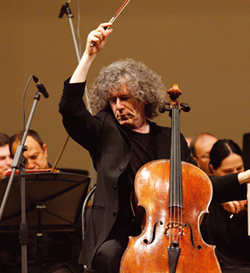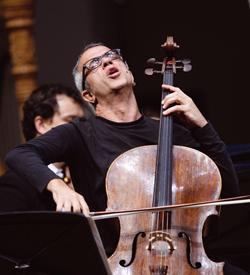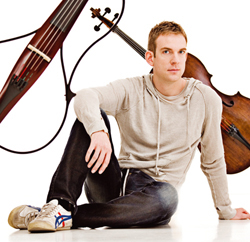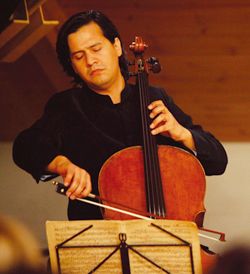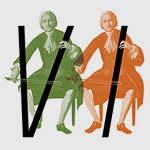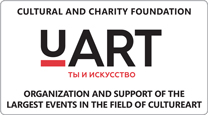Boris Andrianov: every show at Vivacello is a unique story which is unlike all the others
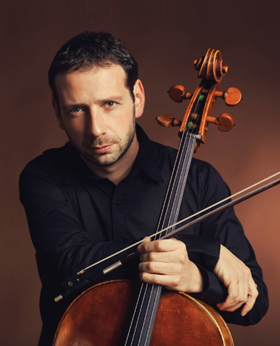 Vivacello festival is always a revelation. It will take place for the sixth time already this year, and of course, people expect the programme to be as much as impressive and vivid
Vivacello festival is always a revelation. It will take place for the sixth time already this year, and of course, people expect the programme to be as much as impressive and vivid
— Five festivals have already been held, and one may say that Vivacello has its own format, its own style. What is the festival like today?
— Probably, it is better to start telling this story from the very beginning. The idea to organize such a festival came to me after I visited the “Kronberg Academy” festival where all cellists of the world gather. There is a little town near Frankfurt named Kronberg, where this absolutely incredible festival takes place. Several shows are presented there every day; workshops and academies are organized. During the festival days life is simply in full swing there. I was inspired by this example. I wanted cellists’ festival to be organized in Moscow as well. The first time we held it jointly with the Moscow Philharmonic Hall; it was called “Dedicated to the memory of Mstislav Rostropovich”. And before long I got acquainted with Iveta and Tamaz entirely by accident in a plane. And one day I came to them with a proposition to cooperate. This is how our union was born. We began to work on the festival together, and it was dubbed Vivacello. Certainly, this festival is by no means like the one in Kronberg but it is good, for all intents and purposes. As a result, we made an art festival with an accent on cello.
Over the last years and these five festivals we really showed the most diverse genres, and we went beyond mere concerts every time, like cello and orchestra or solo cellist’s performance, as is customary. We always were able to find something new and interesting. For instance, Gabriel Prokofiev who produced electronic music for duet with cello attended the festival. Many people, I guess, committed the experiments of Giovanni Sollima to memory. We had really interesting special projects every time, and this is what I strive for.
Thinking of the previous festivals, I can say that they were visited by a galaxy of outstanding cellists from all over the world: Isserlis, Geringas, Mayskiy, Rudin, Knyazev, Gutman. Mention but these few names, and it becomes clear that not every festival can boast of such cast. Not to mention that even Roger Moore attended our event.
Roger Moore as a reader at the stage of the Great Hall of Conservatory
— How far did the festival shift from your initial idea?

— The idea has shifted from the initial one, indeed, and I like the way the festival develops, the direction it moves in, very much. It will probably transform and change even further, like a living organism. At present the festival represents a week or two which are not too rich in the events.
Initially I wanted to organize more concerts within shorter periods of time but that would have made sense in some small town where the festival could become the whole existence of it from the beginning until the end. Too many events are delivered in Moscow simultaneously. And organizers such as Tamaz have their own vision of what the Moscow festival should be. Being an artist, I view the festival from a creative angle, and he sees it as a man who also lives both business and social life of this city and knows its laws more. This is the way we came to what you can see nowadays.
|
|
|
Emotions always run high at Vivacello: Steven Isserlis and Giovanni Sollima at the festival concerts |
— And it is the sixth festival already. Let us talk in more detail about what November holds for us. It is clear that posters will be published, and a person who is familiarized with the world of music, seeing them, would understand everything him/herself. You’d better tell me which concerts and why one who, having read the poster, can hardly find anything of interest because he or she is rather far away from this topic, should attend.
— Surely, each concert deserves attention of the public. The Berlin chamber orchestra is probably known to everybody. Even if you see the words “Berlin” and “orchestra” together, it is a brand, understandably. Or, for example, it is telling that Edin Karamazov is a Grammy winner who recorded a CD with Sting himself. He plays lute, guitar and cello — he is really an outstanding musician. By the way, at one of the concerts within the festival’s framework a CD we recorded together with him will be presented. We worked on it in October last year at the Croatian island called Zlarin, and I got a lot of impressions from that work. There is not a single car on the island, and we recorded our music in a medieval church, so the CD was born in absolutely fascinating atmosphere! When we finished, Edin said that he had never done anything more beautiful in his life. Basically, CDs are usually recorded within two days because working in a studio is very expensive. And we had the whole week.
— Which stars would attend the festival this year?
— Great soloists from every corner of the world would attend both opening and closing ceremonies. On November 21 the Oistrakh quartet will play, and this is one of the best Russian musical bands. It was formed recently but it really met with the recognition of the wide public of listeners. Monika Leskovar and Tatyana Vasilyeva will play at the opening ceremony. These are the musicians with whom I was lucky to study with. Tatyana Vasilyeva is a winner of the competition named after Rostropovich, and since recently she works as a solo cellist in the best orchestra in the world in Concertgebouw in Amsterdam. Monika Leskovar from Croatia is also a cellist of international renown. She is justifiably a legend in Croatia, certainly. She was so popular back in the days when we studied, about 12 years ago, that you could buy a Croatian crossword puzzle and see her photo and a question “Who is this?” below in it. That tells its own tale.
— There is always something original,
— We will have an original project with video installations in the Multimedia Art Museum. One of the installations is based on Schenberg’s brilliant work named “Transfigured Night”. It will be played by a string
— New pieces are played at every Vivacello festival. What is the fate of these pieces? Are they being played somewhere else?
— Well, this is an absolutely uncontrolled, spontaneous process. But our premieres are played, yes. The concerto of Alexey Rybnikov which was played at Vivacello for the first time, transformed into a concerto for solo cello these days. Vangelis’ piece is played both by me and many other cellists. The premiere of Efim Podgayets’ piece took place last year. You can also listen to it somewhere today.
— The first performance of a piece, the premiere is probably an exciting event for a composer? The thing that everything can be ruined by execution…
— Therefore composers do not create music for people who are unknown to them and work on their pieces together with a performer. We will sit somewhere with Pasha soon, and I will tell him, “No, it is hard to play like that here, rewrite this part”, and he will answer, “I want it to be played in different way here, play in a different manner”. It is a very complicated creative process, and there is a plethora of interesting examples of cooperation between the author and performer. For instance, the way Rostropovich worked with Prokofiev on symphony concerto: Prokofiev is a pianist, and it is written very conveniently for cello because they thoroughly checked the whole score up.
— On November 24, the day of closing of the festival, Alfred Schnittle would have turned 80. What programme do you prepare for that evening?
— On the final night we will perform Schnittke’s 1st concerto for cello and orchestra. It was composed for Nataliya Gutman but nevertheless, I will perform it. It is very pleasing, honorable and responsible for me to play the composer’s greatest piece on a day of his anniversary in Moscow. I have been dreaming for a long time to play this concerto in Moscow; it is one of my favorite pieces. It is a symphony for a great orchestra; it implies power and grand scale — well, those who listen to it would confirm my words. In the end of the piece cello plays along with a dynamic. It is worth saying that Schnittke’s 1st concerto never leaves the audience cold.
|
Virtuoso cellist Johannes Moser —master of gorgeous sound, musician who enslaves hearts by spectacular style of play which may vary from soft and elegant to furious and energetic in the mood of a rock star. Johannes Moser was said to be one of the best young cello virtuosos by Gramophone magazine. |
— I have an example. Many years ago a nephew of my friend asked me to advise some cello music to him. I recommended a cello concerto of Lalo which, by the way, will also be played at the festival. It is very beautiful music of the French composer with Spanish spice. Truly speaking, the nephew became bored after five minutes or so, and he asked me for something different. I told him, “Well, there is Schnittke but I guess you won’t be able to listen to his works for a long time”. But he listened to it in headphones twice, and the piece’s length is 40 minutes. So, he bathed in this concert for about an hour and a half! He said that a train wreck was present there and many other things!
— The organizers of the festival repeatedly said that Vivacello contributed to popularization of classics. People suddenly realize at concerts that they are really interested in classical music. If we switch off from the festival now, basically, what needs to be done so that such discovery happened to you?
— One should go to a good concert where some outstanding performer plays. It is necessary to go there for the first time and work with one’s soul a little bit. My favorite quotation from Solaris movie is about the fact that music, although it touches our lives tangentially and there is no direct interconnection, excites people like no other art. Intrinsically, it makes us react to mere noise brought to harmony. And all people are somehow mysteriously prone to falling in love with real art.
|
Claudio Bojorquez studied under B. Pergameschikov and shot to stardom at prestigious international competitions in his green years. Today he is a professor of the Higher school of music in |
Actually, people discover the world of classical music in a very simple way, and they discover a distinctly different level of emotions and feelings. Therefore, a really good concert cannot leave you unfazed. But I will repeat that many things depend on the performer in music. It is impossible to overrate the magic of a man who plays, who tells his story directly. Therefore, people often ask “Who plays?” instead of “What is played?” these days. For example, Pink Floyd is also real art. And Strauss’ waltzes, though they are very beautiful and are played for many years, are still like pop songs. And first and foremost we try to invite good musicians to our festival and present not only academic but rather versatile music.
— Which festival concert would you recommend to a person who is embarrassed by the programme: he does not know any names or even musical instruments…
— At first, we made the programme up in such a way that inexperienced people can visit any concert. All of them are different, and everybody will be able to find something interesting. I highly recommend those who read this conversation and those who have never went to a classical concert to will themselves into going to at least one evening within the festival’s framework. Let them write me a letter later and say “I disliked it”. I am responsible for quality, for the music we would play. We will have both mirthful and entertaining, it will be possible to both laugh and cry; whatever you want. But every man will come and think of something, recall something, invent something, become inspired in something.
Back

